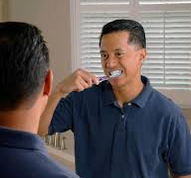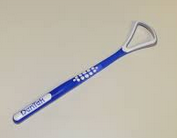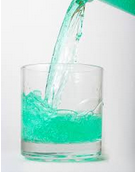Level Two
The cause of bad breath in many people is poor oral hygiene therefore a combination of the following self-help tips and treatments can help to improve their oral hygiene, and as a result reduce their bad breath. However depending on the severity of the underlying cause the following may only disguise bad breath.
Teeth brushing - The suggested treatment for bad breath which is caused by bacteria in the mouth is a good oral hygiene routine. It is recommended that a person brushes their teeth at least twice a day using toothpaste that contains fluoride. Here are a number of tips you can provide to patients:
- Use a small to medium sized toothbrush with soft multi-tufted synthetic bristles
- Replace toothbrushes every three to four months
- Teeth should be brushed for at least two minutes

- When brushing pay attention to the gum line
- Do not brush teeth for at least an hour after eating or drinking, as many foods and drinks contain acid which softens tooth enamel and the action of brushing can cause erosion. Dentists recommend that teeth are either brushed before meals or at least one hour after meals
- Clean between the teeth at least twice a day with dental floss to remove debris that cannot be reached by a toothbrush
- Have regular dental checks, a dentist will advise how often these checks should take place (usually at least once a year)
Tongue Cleaning
Bacteria can build up on the tongue which can cause bad breath therefore it is recommended to clean the tongue each day as part of the oral hygiene routine. Some people use a soft toothbrush dipped in mouthwash but it is more effective to use a tongue scraper. These can be purchased from pharmacies and can sometimes be found on the back of the toothbrush. A scraper should be placed as far back as possible on the tongue and then brought forward scraping the surface of the tongue.
build up on the tongue which can cause bad breath therefore it is recommended to clean the tongue each day as part of the oral hygiene routine. Some people use a soft toothbrush dipped in mouthwash but it is more effective to use a tongue scraper. These can be purchased from pharmacies and can sometimes be found on the back of the toothbrush. A scraper should be placed as far back as possible on the tongue and then brought forward scraping the surface of the tongue.
Mouthwashes
Mouthwashes can be used as part of an oral hygiene routine. They are used to rinse out the mouth after brushing and flossing to help clean and protect the teeth and gums from decay or disease. Many people also like the after taste and breath freshening properties of mouthwashes.
A mouthwash can have a number of different functions and most will have a combination of the following and it will depend on personal choice as to which one a patient chooses:-
- Antibacterial - help to get rid of plaque and hence protect teeth and gums from decay as well as disguise bad breath
- Fluoride - fluoride re-mineralises microscopic holes in the enamel which are caused by acids.
- Cosmetic - these are used to mask bad breath and do not help to protect teeth
- Natural - contain natural ingredients and are alcohol free
- Home-made - usually used to treat a mouth infection or after a tooth extraction and are made up of salt and warm water
